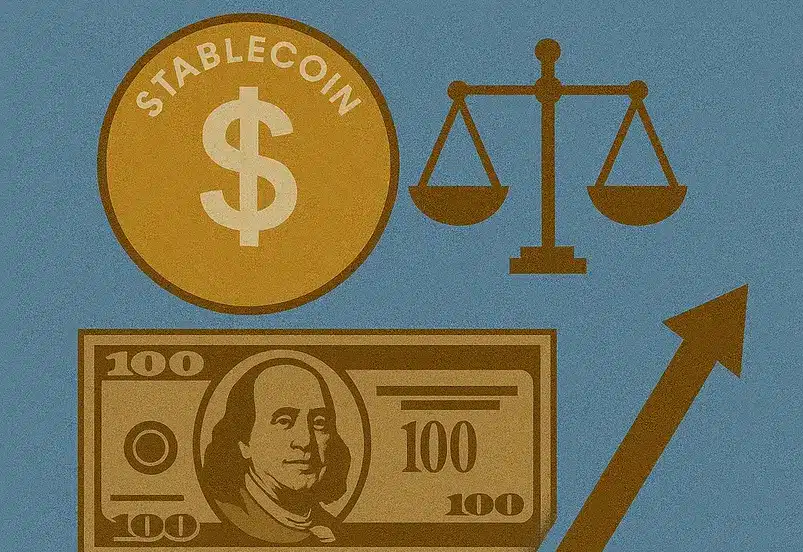The Law Nobody’s Talking About
If you have money in any bank account, what you’re about to read could save or cost you hundreds of thousands of dollars. The GENIUS Act just became law on July 18th, signed by President Trump, and it’s about to change everything about how Americans store and access their money. Wall Street is salivating at the chance to get their hands on your retirement savings through a sophisticated new system that most people don’t even know exists.
GENIUS stands for “Guiding and Establishing National Innovation for US Stablecoins.” It promises to make America the crypto capital of the world. But the reality is far more complex—and potentially far more dangerous. This isn’t just about regulating cryptocurrency. This is about creating a control mechanism where every transaction can be tracked, frozen, seized, or destroyed. And we already have a preview of what that looks like.
The Vietnam Precedent That Changes Everything
On September 1st, Vietnam froze 86 million bank accounts overnight—nearly the entire population of the country. They introduced mandatory biometric verification. If you didn’t have facial scans or fingerprints registered, you lost access to your money. Gone. Foreign residents had to fly back to Vietnam just to save their bank accounts. Some accounts were simply deleted. No way to find out if there was money in them. No remote options. Nothing you could do.
This matters to Americans because it’s not isolated. Similar moves are happening globally. The same biometric systems being pushed in the US are the systems they used in Vietnam. We now have a precedent: governments can freeze accounts at will. And the technology exists to do it instantly, without warning, without recourse.
When Canada had the trucker protests in 2022, they froze accounts. Vietnam just froze 86 million accounts. The same technology is coming to America. Same systems, slightly different packaging. This isn’t happening in 20 years. This is happening now.
How The GENIUS Act Creates A Control Mechanism
Here’s what the GENIUS Act actually does. It creates federal regulation for stablecoins—cryptocurrencies designed to maintain stable value, typically pegged to the US dollar. But the regulation creates massive gatekeeping. Only banks, credit unions, and Fed-approved institutions can issue stablecoins. If you’re a company wanting to start a stablecoin, you need approval from the Treasury, the Fed, and the FDIC. That means there’ll be no more new stablecoins—it’s almost impossible to get approval. The companies that already have stablecoins now have a monopoly.
Every stablecoin will be backed by US dollars or treasury bills—government debt. Here’s how it works: you buy a stablecoin with real dollars. The stablecoin company takes your dollars and buys treasury bills with them, earning interest—about 5% on billions and trillions of dollars. You get nothing. Your stable dollar is actually just backed by US government debt. That’s all it is.
But here’s the dangerous part: all issuers are subject to the Bank Secrecy Act. Everyone needs to comply with anti-money laundering requirements, which means they can ask you where your money came from. And they have the technical ability—and this is crucial—to freeze, seize, or burn stablecoins when “legally required.” Someone can go into your digital bank account and freeze it, steal from it, or just destroy your money.
The Surveillance System That Tracks Everything
This creates complete financial surveillance. Every transaction can be tracked 100% and frozen, seized, or burned. The Palantir connection reveals how this works. Palantir, the data analytics company founded by Peter Thiel—a key Trump ally—has contracts with the SEC, the IRS, and other government agencies that handle money. They work with stablecoin banks to create a monitoring system.
Here’s how it works: digital IDs are required for high-value transactions. Every transaction is recorded permanently and publicly. Your biometric data—facial scans, fingerprints, facial recognition—is linked to your transaction history. It’s a perfect setup for surveillance.
The result? Complete financial surveillance. The ability to track every dollar, every transaction, every movement of money. And if someone decides your transaction is suspicious, illegal, or politically inconvenient, they can freeze it, seize it, or destroy it—instantly.
Why The Government Needs This
The real agenda is about the dollar and debt. Just like oil in the past forced countries to buy dollars because oil was only ever bought and sold in dollars, stablecoins do the same thing digitally. The US has $35 trillion in debt and desperately needs somebody to buy that debt. Foreign countries aren’t buying it—the only foreign countries buying US debt are the British and Europeans. The rest of the world together is actually selling US debt.
But stablecoins create an automated buyer for US debt. It’s how stablecoin companies make money—they take your dollars, buy treasury bills, keep the interest. Now anybody in the world with a smartphone, even without a bank account, can hold these new digital dollars—which are really just US debt.
This isn’t really innovation. It’s about two things: money for the big banks and the companies that own stablecoins, and control. Think about the next step: what about a 1% transaction tax? Sounds like VAT, doesn’t it? Value added tax. You’ll be able to put it on everything internationally, worldwide, forever. It would be the simplest thing to collect. Do you think governments aren’t going to do that?
Understand the System. Protect Your Future.
When governments and corporations rewrite the rules of money, ordinary people feel the shockwaves first. The best defense is awareness—and preparation. Position yourself for the future economy before it positions you.
Explore Future-Proof Careers →The Risks That Could Devastate Your Wealth
Stablecoins are basically debt funds. Wall Street calls them money market funds because it sounds fancier. But in 2008, when we had the global financial crisis, money market funds just froze. Banks got bailed out. Stablecoins? So far, we’re not so sure. There’s serious panic potential here.
The winners are clear: big banks because they have approval to issue stablecoins, the treasury bond market because the US government can issue debt and sell it to forced buyers, and companies like Palantir and their shareholders.
The losers? Privacy—there won’t be any. What are you buying with your money? Everything will be tracked. Small banks won’t be issuing these stablecoins, so they’ll struggle. And cash—cash is becoming a thing of the past. Dubai is phasing out cash by next year. This isn’t happening in 20 years. This is happening really soon. And places like the Middle East, Thailand, and Vietnam are test markets—testing grounds for US technology.
How To Protect Your Financial Freedom
Your financial freedom is actually at stake here. So how do you protect yourself? The easiest way is always to have more money—that gives you more options. But beyond that, here’s what you need to consider.
Physical gold. That heavy, shiny, beautiful stuff. It can’t be digitally seized or frozen. You might have to hide it—if you put it in a bank safe deposit box, they can freeze the deposit box. But if you physically possess it, it’s actually yours.
Bitcoin. Yes, it is decentralized, but watch out for regulation. Every digital transaction is going to have some sort of KYC (know your customer) attached to it, which means everything you do with Bitcoin will also be public. You’re likely going to have to register your Bitcoin wallet number with the US government. They’re going to enforce that. But for the moment, Bitcoin offers some protection—with caveats.
Foreign assets. Non-US assets might be slower to freeze or seize. Real estate is actually real, hard to confiscate, and yours. I would limit stablecoin exposure as far as possible. Don’t be overly reliant on digital assets. Keep some physical assets—gold, real estate, physical stuff you actually own that you could sell.
Don’t put everything into the US. If you’re American, that’s harder, but you could hold different currencies. Gold, silver, and real estate are the obvious ones. You could be in multiple jurisdictions—have bank accounts in multiple countries, residencies in multiple countries. If you’re American, it’s harder because a lot of banks don’t want you because your government’s regulations are complex and you always pay tax anyway, but it’s worth exploring.
Keep some cash. It’s going to lose value tremendously, but you’re going to want to have some cash because what happens when your bank account is frozen and they blame it on an IT issue or national security, and ATMs don’t work? What are you going to pay with? Maybe you think that’s crazy. Well, COVID was pretty crazy, and that actually happened.
The Bottom Line
The GENIUS Act isn’t about innovation. It’s about money for the big banks and control for the government. Vietnam shows us a frightening playbook. The ability to freeze accounts at will, to track every transaction, to seize or destroy money instantly—this is coming to America. Same technology, slightly different packaging.
When’s this coming? The Treasury has some rulemakings to complete, but it’s coming. How aggressively will they monitor it? We don’t know. But all it takes is for somebody to buy a gun with a stablecoin and shoot at somebody political, and it becomes terrorism, and then we’re going to get this “crazy ass regulation” in place where everything gets tracked to the nth degree—and no one’s going to complain about that.
Your financial freedom is at stake. Understand these systems before they’re properly implemented. Diversify. Start building some alternative wealth storage. Don’t tell anybody about it. And don’t just jump into every single new technology because they’re coming for your data.
The bottom line: the GENIUS Act creates a system where your money can be frozen, seized, or destroyed at will. It enables complete financial surveillance. It forces people to buy US debt through stablecoins. And it eliminates financial privacy. If you hold any dollar assets—your savings, your 401(k)s, your bonds—this matters. Your financial freedom depends on understanding what’s coming and protecting yourself accordingly.
Key Takeaway
The GENIUS Act creates federal regulation for stablecoins that enables accounts to be frozen, seized, or burned at will. Vietnam’s freezing of 86 million accounts shows the precedent. Every transaction can be tracked through biometric-linked digital IDs. Stablecoins are backed by US debt, creating forced buyers for $35 trillion in government debt. Winners: big banks, Palantir, treasury bond market. Losers: privacy, cash, small banks. Protection requires diversification: physical gold, Bitcoin (with caveats), foreign assets, real estate, multiple jurisdictions, and cash. The act isn’t about innovation—it’s about money for big banks and control for government. Financial freedom is at stake.




